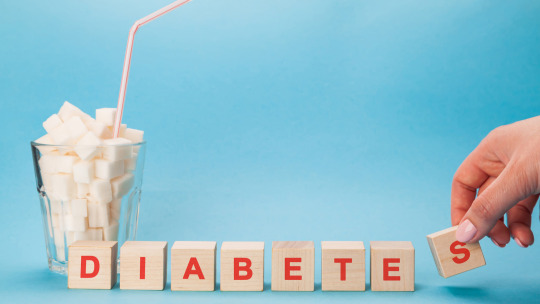Don't wanna be here? Send us removal request.
Text
0 notes
Text
Understanding Diabetes: Types, Symptoms, and Management
Introduction
Diabetes, also known as diabetes mellitus, is a metabolic disorder that leads to elevated blood sugar levels. This occurs due to insufficient insulin production or the body’s ineffective use of insulin, causing glucose to accumulate in the bloodstream, leading to hyperglycemia. Persistent high blood sugar levels can result in various health complications like heart disease, nerve damage, and vision issues. It’s a chronic condition affecting people of all ages, but it can be effectively managed with lifestyle changes and medications.
Types Of Diabetes
1. Type 1 Diabetes
Definition and Causes: An autoimmune disease where the immune system attacks insulin-producing cells in the pancreas. It typically starts in young adults and children, leading to a decline in insulin production.
Symptoms: Frequent urination, excessive thirst, fatigue, unexplained weight loss, among others.
Diagnosis: Blood glucose test, A1C test, and antibody test.
Treatment: Requires daily synthetic insulin doses, monitoring blood glucose, and insulin administration.
2. Type 2 Diabetes
Definition and Causes: Results from insufficient insulin production or the body’s resistance to insulin. Commonly affects adults but can also occur in children. If untreated, it can lead to severe health issues.
Symptoms: Excessive thirst and hunger, fatigue, blurred vision, frequent urination, among others.
Diagnosis: Various tests including fasting glucose test, A1C test, and oral glucose tolerance test.
Treatment: Managed through lifestyle changes, medications, and monitoring blood sugar levels.
3. Gestational Diabetes (GD)
Definition and Causes: Develops during pregnancy due to hormonal changes affecting insulin function. It increases the risk of type 2 diabetes later.
Symptoms: Often subtle but may include thirst, frequent urination, and fatigue.
Diagnosis: Glucose challenge test and glucose tolerance test during pregnancy.
Treatment: Managed through diet, exercise, and sometimes insulin.
4. Other Types
LADA: Slow-developing autoimmune diabetes in adults.
MODY: A genetic form of diabetes.
Secondary Diabetes: Results from other medical conditions or medications.

Complications Of Diabetes
Diabetes can cause short-term complications like hypoglycemia and long-term complications such as cardiovascular issues, kidney disease, nerve damage, and more.
Managing Diabetes
Lifestyle Changes: A healthy diet, exercise, and weight management are crucial.
Medications: Insulin, oral medications, and other injectables are used based on the type of diabetes.
Blood Sugar Monitoring: Regular monitoring using glucose meters or Continuous Glucose Monitoring (CGM) devices is essential.
Treatment Approaches
While insulin remains a cornerstone in type 1 diabetes treatment, various types and delivery methods exist, allowing for tailored treatment plans. For type 2 diabetes, medications like metformin, along with injectable or oral medications, aid in controlling blood sugar levels. Emerging treatment options, such as artificial pancreas technology and innovative medications, show promise in improving management strategies.
Further Insights
Delving deeper, latent autoimmune diabetes in adults (LADA) and maturity-onset diabetes of the young (MODY) underscore the diversity within diabetes. LADA, often misdiagnosed as type 2 initially due to its slow progression, eventually resembles type 1 diabetes. MODY, characterized by genetic abnormalities affecting insulin production, underscores the importance of familial history in diabetes diagnosis.
FAQs
Diagnosis: Diabetes is diagnosed through tests like A1C, fasting plasma glucose, and oral glucose tolerance tests.
Symptoms of High/Low Blood Sugar: High sugar symptoms include nausea, excessive thirst, while low sugar symptoms encompass sweating, dizziness, and weakness.
Cure for Diabetes: There’s no cure, but proper management can control it.
Treatment Options: Include various medications, insulin administration methods, and alternative treatments like weight-loss surgery.
Lifestyle Changes: Focus on a balanced diet, exercise, weight management, and avoiding smoking.
Prevention: Diabetes can be prevented with a healthy lifestyle and weight control.
Understanding the types, symptoms, and management of diabetes is crucial for effective control. With the right treatments and lifestyle adjustments, individuals can take charge of their health and improve outcomes.
SLVC Clinic: Specialized care for diabetic foot complications, offering advanced treatments like wound care, vascular assessment, and specialized footwear.
1 note
·
View note